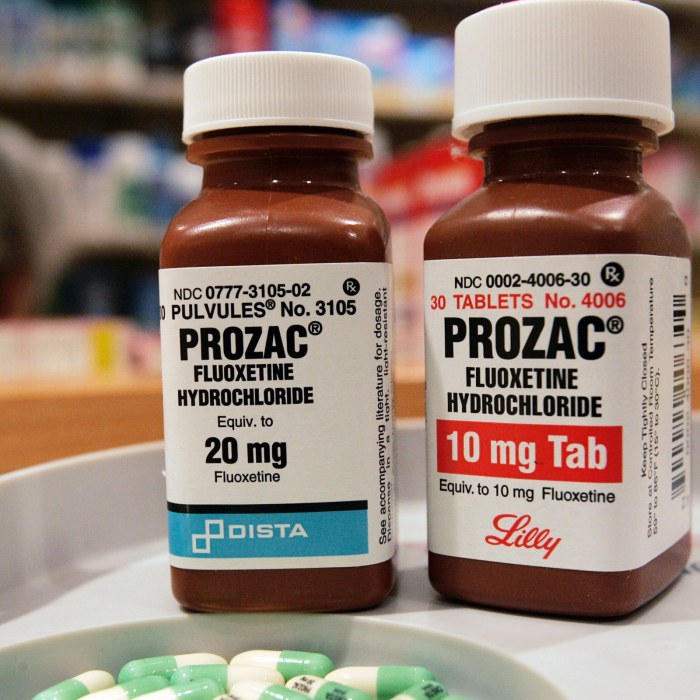Prozac, the brand name for fluoxetine, revolutionized the way we understand and treat mental health. Its discovery in the 1980s marked a turning point in the field of psychopharmacology, ushering in a new era of selective serotonin reuptake inhibitors (SSRIs) and sparking widespread debate about the role of medication in mental well-being.
Prozac’s impact extends far beyond its therapeutic applications. It has become a cultural touchstone, influencing public perception of mental illness and prompting discussions about the ethics of medication-based treatment. This exploration delves into the history, science, and societal implications of Prozac, shedding light on its complexities and its ongoing influence on our understanding of the human mind.
Prozac and Society

Prozac, the brand name for fluoxetine, has had a profound impact on society, both in terms of its medical applications and its cultural influence. Its introduction in the late 1980s marked a significant shift in the understanding and treatment of mental health, leading to widespread discussions about depression and anxiety. This essay will delve into the cultural impact of Prozac, examining its role in shaping public perception of mental health, exploring the ethical considerations surrounding its widespread use, and analyzing the debate on over-prescription and potential misuse.
The Cultural Impact of Prozac
Prozac’s introduction coincided with a growing awareness of mental health issues in society. Its effectiveness in treating depression, coupled with its relatively mild side effects, led to a surge in public interest and a shift in the way mental health was perceived. The drug’s popularity was fueled by media attention, which often portrayed Prozac as a miracle cure, capable of alleviating the symptoms of depression and anxiety in a matter of weeks. This media portrayal, while sometimes exaggerated, helped to destigmatize mental illness and encourage open conversations about mental health.
Prozac’s impact on society extended beyond its medical applications. The drug became a cultural phenomenon, influencing literature, film, and popular culture. The novel “Prozac Nation” by Elizabeth Wurtzel, published in 1994, explored the personal experiences of a young woman struggling with depression and her relationship with Prozac. This book, along with other media representations of Prozac, helped to raise awareness about the realities of mental illness and the role of medication in treatment.
Ethical Considerations Surrounding Antidepressant Use
The widespread use of Prozac and other antidepressants has raised ethical concerns. One concern is the potential for over-prescription, leading to the misdiagnosis and inappropriate treatment of mental health conditions. Another concern is the potential for dependence and addiction, although the risk of addiction with SSRIs like Prozac is generally considered low. There are also concerns about the long-term effects of antidepressants, particularly in children and adolescents, as research on these effects is still ongoing.
The ethical considerations surrounding antidepressant use are complex and require careful consideration. While antidepressants can be effective in treating mental health conditions, it is crucial to use them responsibly and to address the underlying causes of mental illness.
The Debate on Over-Prescription and Misuse
The debate on over-prescription and misuse of Prozac is ongoing. Some argue that the pharmaceutical industry has a vested interest in promoting the use of antidepressants, leading to an over-reliance on medication and a neglect of other treatment options, such as therapy and lifestyle changes. Others argue that the availability of antidepressants has helped to improve the lives of millions of people suffering from mental illness.
The debate is further complicated by the fact that there is no clear consensus on what constitutes over-prescription. Some argue that any increase in antidepressant use is evidence of over-prescription, while others argue that the increase is simply a reflection of the growing awareness of mental health issues and the increasing willingness of individuals to seek treatment.
“The debate on over-prescription and misuse of Prozac is complex and multifaceted, with no easy answers. It is important to approach this issue with a balanced perspective, considering both the potential benefits and risks of antidepressant use.”
Future Directions

Prozac, despite its widespread use and impact on mental health treatment, continues to be a subject of ongoing research and development. This research explores new applications for the drug, while simultaneously driving the development of newer antidepressants with potentially enhanced benefits. The future of mental health treatment, with pharmacotherapy playing a crucial role, promises to be even more sophisticated and individualized.
New Applications for Prozac
Ongoing research is exploring potential applications for Prozac beyond its traditional use in treating depression. For example, studies are investigating its efficacy in treating:
- Anxiety disorders: Research suggests that Prozac may be effective in treating various anxiety disorders, including generalized anxiety disorder (GAD) and social anxiety disorder. This is due to its ability to regulate serotonin levels, a neurotransmitter associated with mood and anxiety.
- Obsessive-compulsive disorder (OCD): Prozac is approved for the treatment of OCD, a disorder characterized by intrusive thoughts and repetitive behaviors. Its effectiveness in this area is attributed to its ability to reduce anxiety and improve impulse control.
- Premenstrual dysphoric disorder (PMDD): Studies have shown that Prozac can be beneficial in managing PMDD, a severe form of premenstrual syndrome marked by mood swings, irritability, and depression.
Development of Newer Antidepressants
While Prozac has been a cornerstone of antidepressant treatment, research is continuously developing newer antidepressants with potentially improved benefits. These newer drugs aim to:
- Improve efficacy: Newer antidepressants, such as selective serotonin reuptake inhibitors (SSRIs) like escitalopram (Lexapro) and sertraline (Zoloft), have shown improved efficacy in treating depression compared to Prozac.
- Reduce side effects: Some newer antidepressants have fewer side effects than Prozac, such as sexual dysfunction and weight gain. For example, bupropion (Wellbutrin), a norepinephrine-dopamine reuptake inhibitor (NDRI), is known for its minimal impact on sexual function.
- Offer faster onset of action: Some newer antidepressants, such as vortioxetine (Trintellix), are designed to act faster than Prozac, providing symptom relief more quickly.
The Future of Mental Health Treatment, Prozac
The future of mental health treatment is likely to involve a more personalized and holistic approach, integrating pharmacotherapy with other modalities, such as:
- Psychotherapy: Psychotherapy, including cognitive-behavioral therapy (CBT) and interpersonal therapy (IPT), plays a crucial role in addressing underlying psychological factors contributing to mental health conditions.
- Lifestyle interventions: Lifestyle interventions, such as exercise, healthy diet, and stress management techniques, can complement pharmacotherapy by promoting overall well-being and resilience.
- Brain stimulation therapies: Emerging brain stimulation therapies, such as transcranial magnetic stimulation (TMS) and electroconvulsive therapy (ECT), offer alternative treatment options for individuals who may not respond to traditional medications.
Personal Perspectives: Prozac

Prozac, like any medication, has a unique impact on each individual. Sharing personal experiences can help others understand the complexities of this drug and its potential benefits and drawbacks. While individual responses vary, common themes emerge from these personal journeys.
Impact on Quality of Life
Personal accounts often highlight the positive impact of Prozac on quality of life. Many individuals report feeling a sense of relief from symptoms like anxiety, depression, and obsessive-compulsive disorder. This relief can lead to improved mood, increased energy levels, and a greater sense of well-being. This, in turn, can positively impact relationships, work, and overall life satisfaction.
Personal Insights
Personal experiences provide valuable insights into the subjective effects of Prozac. Individuals may describe feeling more “themselves” or experiencing a greater sense of clarity and focus. Some may note a reduction in negative thoughts and feelings, leading to a more positive outlook on life. Others may report improved sleep quality, increased motivation, and a greater ability to manage stress.
Advice and Support
For individuals considering or currently taking Prozac, it is crucial to understand that the journey with this medication is unique to each person. Open communication with a healthcare professional is essential. It is important to discuss any concerns, potential side effects, and individual responses to the medication. Support groups and online communities can also provide valuable insights and a sense of connection with others who have similar experiences.
Prozac’s legacy is multifaceted. It has undoubtedly improved the lives of countless individuals struggling with mental health conditions, offering hope and relief where there was once despair. However, its widespread use has also raised ethical questions about the potential for over-prescription, misuse, and the delicate balance between medical intervention and personal well-being. As research continues to unravel the intricate workings of the brain and the complexities of mental health, Prozac remains a potent reminder of the ongoing dialogue surrounding our approach to mental illness and the search for effective and ethical treatments.
Prozac, a common antidepressant, works by regulating serotonin levels in the brain. While it’s effective for many, some individuals may require additional support. For those experiencing severe pain, medications like hydromorphone can be prescribed. However, it’s crucial to remember that these medications should only be used under the guidance of a healthcare professional, and their potential interactions with Prozac must be carefully considered.
